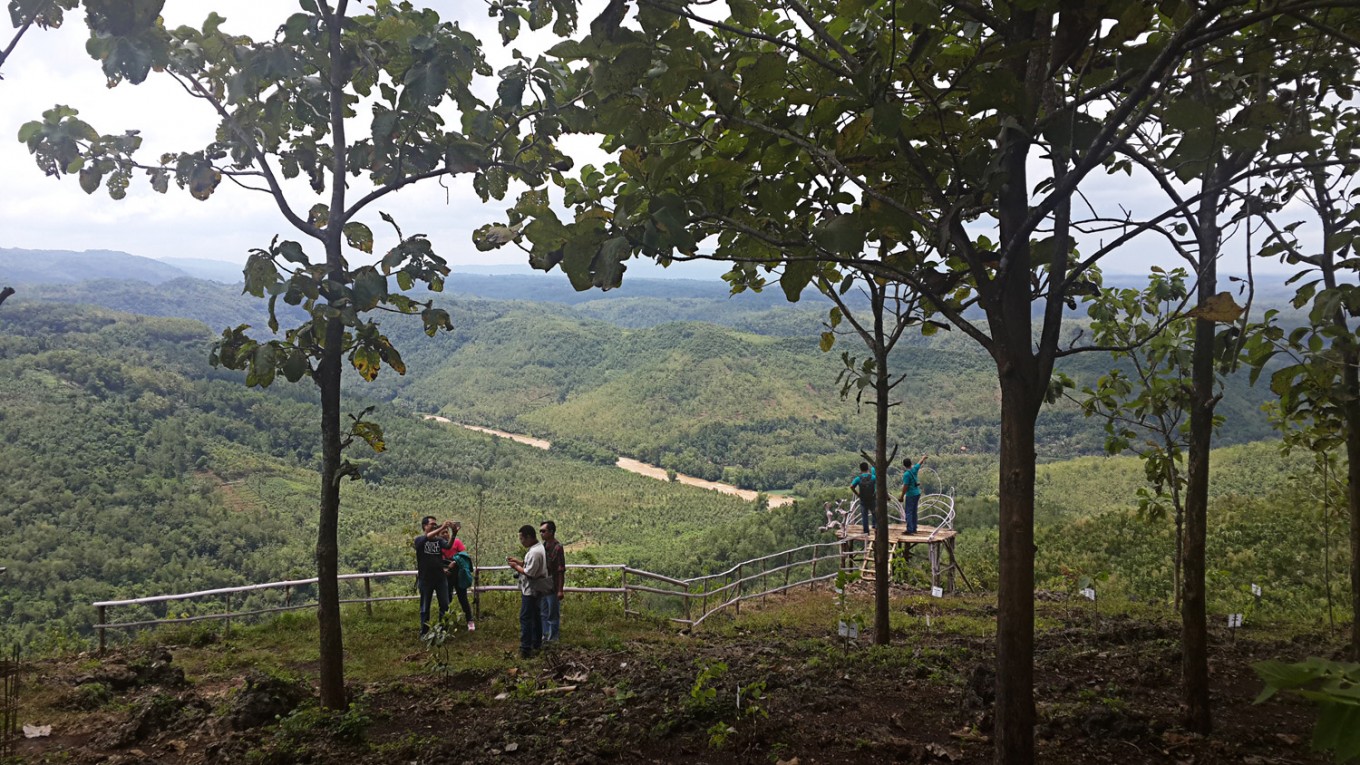Popular Reads
Top Results
Can't find what you're looking for?
View all search resultsPopular Reads
Top Results
Can't find what you're looking for?
View all search results‘Corpse flower’, nature conservation and economic recovery
Safeguarding our land and oceans does more than protect threatened biodiversity, it is also critical to rebuilding economies in a sustainable, healthy way.
Change text size
Gift Premium Articles
to Anyone
W
hen we talk about endangered species in Sumatra, we tend to focus on larger, more charismatic species like the Sumatran tiger, the Sumatran elephant, the orangutan and the Sumatran rhino. Bunga bangkai (the corpse flower) – the world’s tallest flower and a tourist attraction for conservatory greenhouses in Europe and the United States – is just as endangered as the animals.
Although visually charismatic, bunga bangkai, or Amorphophallus titanium in Latin, has a fragrance described by scientists as a combination of rotting cabbage, old socks and decomposing fish. The flower is native to the rainforests of Sumatra, although its existence is now as threatened as those habitats are.
The corpse flower plays a vital role in the rainforest ecosystem. Carrion beetles and other insects that lay their eggs in dead animals are drawn to the flower and, when they depart, spread its pollen. Hornbills and other birds rely on the flower’s fruit for food and also help propagate the plant by spreading its seeds.
This ecosystem, however, has been shrinking rapidly, with deforestation on the island having removed more than half of its rainforests in the last three decades.
A report released by the British Treasury enumerates just how much we have to lose if the corpse flower and its vital rainforest ecosystem perish. The report defines natural capital as an asset and describes how the world is mismanaging nature. It notes that a conservative estimate of the total global cost of subsidies that damage nature, US$4 trillion to $6 trillion per year, completely overshadows the amount that the world invests in nature every year, $78 billion to $143 billion per year.
The great news is that Indonesia shrunk its annual deforestation rate by 75 percent in 2020, during the COVID-19 pandemic, its lowest level since 1990 (when precise record keeping began). The government’s challenge now is to cement these gains and keep slashing the deforestation rate as many of the country’s economic interests – including the palm oil and timber industries – push to expand mainly palm-oil plantations onto currently forested land.
Research has shown, however, that this approach is not worth the environmental damage. Massive palm oil plantations, for example, contribute to economic gains while generating large-scale environmental damage due to deforestation.
To achieve a proper balance between economic and environmental benefits, a growing consensus has identified conserving 30 percent of the planet’s land and ocean as the minimum necessary to halt the escalating biodiversity crisis. An independent study by more than 100 scientists and economists found that meeting the 30 percent target would generate financial and ecosystem service benefits of at least five times the cost. This goal will be discussed at length during the Conference of Parties to the United Nations Convention on Biological Diversity, which meets later this year in Kunming, China.
This 30x30 target is overwhelmingly backed by scientific and economic data and is championed by the High Ambition Coalition for Nature and People (HAC), a growing intergovernmental coalition that has come together specifically to build support for the 30x30 proposal in the Convention on Biological Diversity negotiations. The HAC now has more than 60 members in Asia, Africa, the Americas, the Pacific and Europe. Costa Rica, France and the UK serve as the cochairs of the coalition.
The coronavirus pandemic has shown us what happens to our communities and economies when we don’t protect nature. Governments are now suddenly faced with the realization that protecting nature is not optional.
Safeguarding our land and oceans does more than protect threatened biodiversity, it is also critical to rebuilding economies in a sustainable, healthy way. It’s projected that after the recovery from COVID-19, the nature sector will grow 4 to 6 percent a year, compared to less than 1 percent for agriculture, timber and fisheries.
Instead of being a challenge for development, as some sectors have argued, increased protection and conservation is in fact proving to be good for biodiversity, the climate, fisheries and food security, and it is raising people’s prosperity.
Indonesia has already endorsed the 30 percent marine target as a member of the High Level Panel for a Sustainable Ocean Economy, and multiple interregional coalitions and the G7 are all behind reaching a global agreement to the 30x30 goal at the UN meeting in China later this year.
It’s important to note that most of the areas that remain intact in Indonesia and throughout the world have traditionally been stewarded by indigenous peoples and local communities. Their lands are home to an estimated 80 percent of the world’s plant and animal species. Research shows that formally recognizing their rights will help maintain the healthy natural areas that are left to us.
But while indigenous people comprise approximately one fifth of Indonesia’s population, less than 1 percent of the country’s land is currently recognized as community owned or controlled.
As the world focuses attention on a global goal to protect 30 percent of the world’s oceans and land, Indonesia can show leadership by protecting its tropical rainforest ecosystems. Our country stands out in the world for its natural beauty and resources. It’s time for our country to stand out for the protection of these natural assets as well. Joining the High Ambition Coalition for Nature and People would pave the way.
***
Former environment minister who currently sits on the Global Steering Committee for the Campaign for Nature










